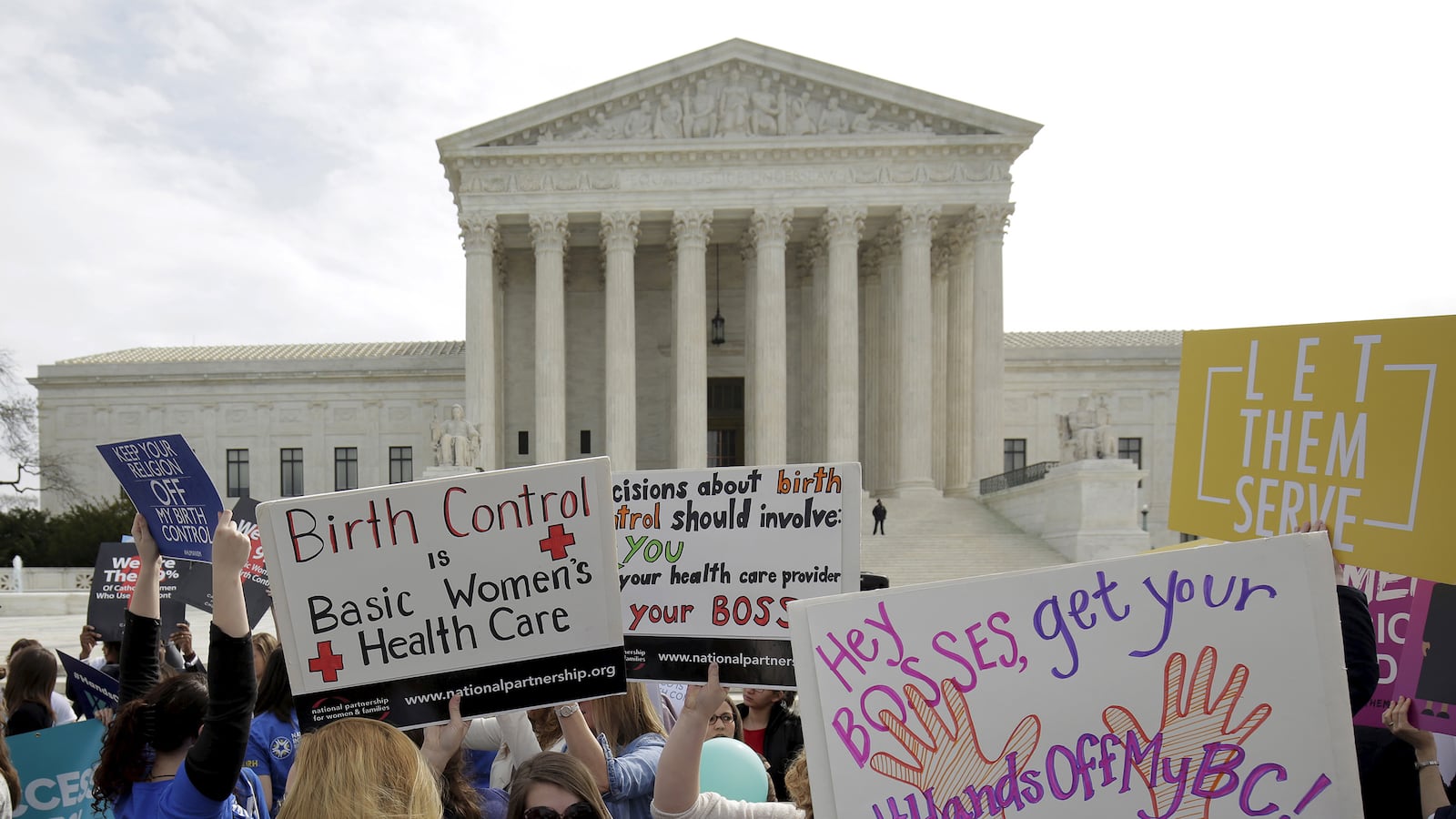In the most-watched religious liberty case of the year, the Supreme decided not to decide the case, and instead ask, a la Rodney King, “Can’t we all just get along?”
That’s the gist of the Court’s remarkable, unanimous, and anonymous opinion in Zubik v. Burwell. Having proposed a compromise in the case last month (itself a highly unusual act), the Court on Monday punted the eight consolidated cases down to lower courts to consider that compromise solution.
The details of the solution are interesting, but even more interesting is what the Court didn’t say—and, most interesting of all, why it didn’t say it.
Zubik was yet another challenge to Obamacare by religious conservatives. Like the infamous Hobby Lobby case, it concerns the so-called “contraception mandate,” namely that health insurance plans cover contraception, just like all other kinds of medical care. Religious organizations are already exempt from that requirement; all they have to do is send a note wishing to opt out.
But a variety of religious nonprofits—organized and represented by a hard-right alliance of lawyers and conservative activists—argued that by exercising that exemption, they’re enabling the coverage to be provided by someone else. In other words, their “no” is really a “yes.”
Activists on all sides looked to the Court to resolve this issue. Is signing a form really a “substantial burden on religious exercise”? If I sincerely feel religiously troubled by signing such a form, am I really complicit in what someone else does as a result?
Surprisingly, however, the Court had a different idea. What if, the Court suggested, the organizations’ medical plans simply omit contraceptive coverage, and insurance companies simply provide that coverage separately—since they are required to do so by law? Everybody wins, right? Women get their contraceptives, employers’ hands are clean, and government policy is fulfilled.
Responding to the proposal, the conservative organizations applauded it, and the government reluctantly went along. (After all, the government’s position is that the existing regulations are fine as is, so why change them?)
And so, today, in a short per curiam (“for the court”) opinion, the Court sent all of the cases back down so that lower courts could reconsider their opinions in light of this new compromise, which everyone has signed on to. Most likely, though the details will likely vary, the end result will be an adoption of the Court’s compromise.
Meanwhile, the Court has expressly not decided any of the key issues in the Zubik cases. Overall, this is a victory for the conservatives, because they’ve succeeded in changing government policy. But it’s not a total victory, because they haven’t won any precedent from the Supreme Court—indeed, they’d lost all but one of the circuit court cases – and so the state of the law today is exactly the same as it was before any of this costly litigation began. (Indeed, the biggest loser is the American taxpayer, who has had to pay for all of it.)
Knowing full well that this victory would be claimed, Justice Sotomayor (joined by Justice Ginsberg) wrote separately to emphasize that nothing has been decided. “Lower courts should not construe… today’s per curiam… as signals of where this Court stands,” she wrote, noting that courts “have ignored those instructions” in the past. Nothing has been decided, Justice Sotomayor emphasized. Don’t get excited.
All of this, though, is weird. Although the Court order did point out a couple of similar instances in the past, normally it does not act like Judge Judy and impose a compromise of its own devising. So why now?
Although it’s speculation, the conventional wisdom is that the Court did all this to avoid a 4-4 split, which would perpetuate the uncertainty and resolve even less than this non-opinion did. With Justice Scalia’s seat vacant (and no end to Republican obstructionism in sight), it’s not hard to do the math: Roberts, Alito, Thomas, and Kennedy on one side;, Breyer, Ginsberg, Sotomayor, and Kagan on the other side. Where Justice Kennedy used to be the swing vote in close cases, now he’s the tying vote.
Four-four splits are bad for everybody, but most of all, they’re bad for the Court itself. The Supreme Court hears only around a hundred cases a year, out of a pool of several thousand. It chooses these cases because there’s an open controversy and a need for resolution. A deadlock represents a fundamental failure of the Court to do its job.
Of course, many progressives say that’s exactly the point: allowing the Supreme Court to deadlock is a result of the Senate’s refusal to consider President Obama’s nominee, Judge Merrick Garland. Maybe it would be better for that dysfunction to be laid bare for all to see.
That, however, is probably not how Chief Justice Roberts sees it. As pundits have noted, the Chief Justice seems intent on restoring the Court’s legitimacy after a decade of shameful decisions, most importantly Bush v. Gore and Citizens United. (Of course, some conservatives think Roberts has himself delegitimized the Court by twice saving Obamacare.) He’s not going to allow the ship to sink just so that someone—let alone Senate Democrats—can make a point.
The Zubik opinion is like a MacGyver contraption, Scotch-taped together and just barely dodging the bullet of a 4-4 deadlock. But it might just work. From one perspective, that reveals the strain the Supreme Court is under, and is a sign of dysfunction. But from another, like MacGyver or Apollo 13 or The Martian, it is a sign of judicial ingenuity, working to resolve crucial questions under highly imperfect circumstances.
And let’s remember that at the end of the day, the employees of these religious organizations will have their health-care rights intact, and their bosses’ concerns will be assuaged. That’s not nothing, even if this kind of dispute resolution reminds one more of Night Court than the Supreme Court of the United States.





